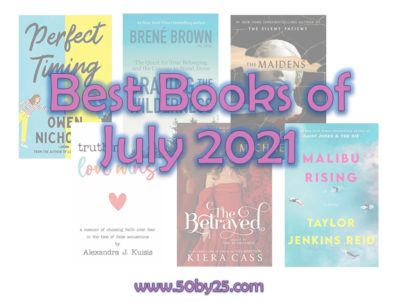This is a catch up post, but includes all eight books I read in July 2021.

4 stars:
Perfect Timing, by Owen Nicholls: This was a really interesting and long drawn out love story. Tom and Jess have a meet cute, but the timing isn’t right, and they continue getting the timing wrong for years. It’s really interesting to see how their paths keep crossing, and they keep miscommunicating. This wasn’t a light read, so not your typical rom com, but I still really enjoyed it – it actually felt a bit more believable because it wasn’t so saccharine. I liked seeing the challenges each character faced, even if they had their flaws and sometimes I was annoyed with each of them 🙂 Overall, a solid novel!
Truth Matters, Love Wins: a memoir of choosing faith over fear in the face of false accusations, by Alexandra J. Kuisis: Alex is a childcare worker who is accused of molesting a child years ago, and her world is turned upside down. This memoir walks through her time with the family in question as well as what happens after she’s accused, including the long drawn out court process. I know from my own experiences volunteering that our criminal justice system is a mess, so while that part was heartbreaking, it also sadly wasn’t surprising to me. But there were other parts of the book that felt a little bit hard to believe, even though I would imagine they were true. Sometimes the truth makes less sense than fiction! I found myself a little put off by all the woo woo stuff (there is a big focus on a psychic and Alex’s routines to “bind” people into glass jars, bury them in her garden, and stomp on them daily to help with the trial?), but this was still a really compelling read that was hard to put down.
Braving the Wilderness: The Quest for True Belonging and the Courage to Stand Alone, by Brené Brown: I’m normally not a big Brene Brown fan, but this book felt like it got into her philosophy and insights without being either too woo woo or too sanctimonious. I read this as part of a Defy Ventures book club, with reading partners who were incarcerated, and we had a good discussion going via snail mail of what each chapter meant to us.
The Betrayed, by Kiera Cass: The problem with duologies / trilogies is that the authors often presume we remember every bit of the first book. Well, I did not with this one, since I read The Betrothed over a year ago, and I wish there had been some kind of refresher. Hollis was previously engaged to the future king of Coroa, but ran away to instead marry a regular guy, Silas. At the end of The Betrothed, there is a massacre at her wedding, and Silas and all Hollis’ family is killed. In this book, she’s on the run with the few remaining members of Silas’ family, as they try to incite a revolution. This was a quick, frothy read, and while I struggled to remember pieces of the first book, I still enjoyed it. I think the duology would probably be much better if you read them back to back.
The Maidens, by Alex Michelides: Mariana lost her husband in a tragic accident, and is trying to get over her grief when her niece calls – her niece’s best friend has disappeared. As a psychologist, Mariana goes to support her niece, but finds herself investigating a serial killer. I didn’t find this quite as enjoyable as Michaelides’ first book, The Silent Patient, both because the characters weren’t as likable or compelling and because the plot took a long time to get anywhere. Mariana was rather annoying in her insistence on pursuing the killer, when she had no background in criminal investigations and was told by the police to stay away. I also found the inclusion of Greek history and literature to be a bit overly didactic, rather than adding to the story. However, the creepy vibe was definitely exciting to read and made it tough to put this down.
Malibu Rising, by Taylor Jenkins Reid: June and Mick Riva meet and fall in love in the 1950s, having several kids while Mick becomes a singer sensation… and a serial cheater. The book flip flops between the family dysfunction of the 1950s/1960s and the initially-more-stable summer of 1983, when the kids are in their 20s and are preparing for the annual Riva beach house bash. It was particularly interesting to see the contrast between the lavish life Nina (the now-matriarch of the family) lives at 25 vs as a teen. As usual, Taylor Jenkins Reid knocks it out of the park with character development, and I found this hard to put down. Definitely a good beach / pool read!
3 stars:
Rabbits, by Terry Miles: Mixed review from me on this one. Rabbits is some sort of high-stakes game that’s been played every few years for decades, yet seems to involve paranormal phenomena that happen to each player no matter where in the world they are. It’s edgy and dangerous, and recently, many players have been disappearing and/or dying. I spent the first 2/3 of this being really confused as to what was going on, but somehow intrigued to keep reading, and then things finally got explained and it came together… a little bit. There was still a lot left unexplained, and I found the whole thing rather confusing. Afterward, I later learned this is based on a podcast – so maybe I would have enjoyed it more if I was a fan ahead of time? As it was, I kept thinking about it for a little while after reading, but it felt so out there and confusing throughout that I really couldn’t recommend it. A friend read it at the same time, and while we were eager to discuss it together, it was more to be like “do you understand what’s going on?? HELP.” I think this could have been tightened up a lot before publication – it felt like a lot of the book was happenstance rather than the characters intentionally doing something.
A World Without Email: Reimagining Work in an Age of Communication Overload, by Cal Newport: I was really disappointed by this book. It started strong, explaining how email has come to dominate the knowledge economy and how it’s taken away from our ability to get into deep work and actually accomplish things. In the first few chapters, the author made some great points around how problematic email can be in fostering a “hyperactive hive mind” that is more about informing others / passing the buck rather than actually doing – emails beget more emails! However, the middle of the book repeats that message over and over but doesn’t get into actual solutions, and also feels rather dated in how it holds up Trello and other task management systems are revolutionary – whereas I think most knowledge workers have at least tried, if not permanently adopted, these tools. I found this really a slog to get through, especially since the vast majority of readers will not have the power to completely change company culture from the top down. It’s only in the last few chapters that the author talks about changes individuals can really make, and they aren’t quite as revolutionary as would be needed to truly disrupt the hyperactive hive mind model. I still think this is an interesting book, but I wouldn’t recommend the middle. Read the beginning, skim the middle chapters for examples that are relevant to you, and then enjoy the more interesting end.
Any book recommendations for me? Follow me here on Goodreads to keep up with what I’m reading in real time.
